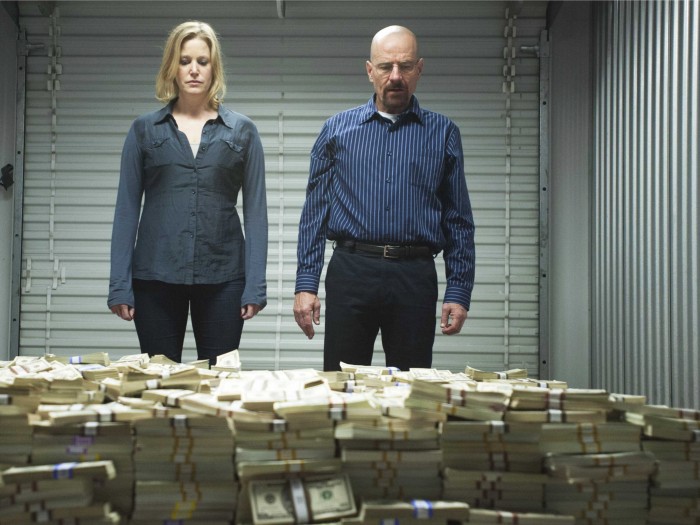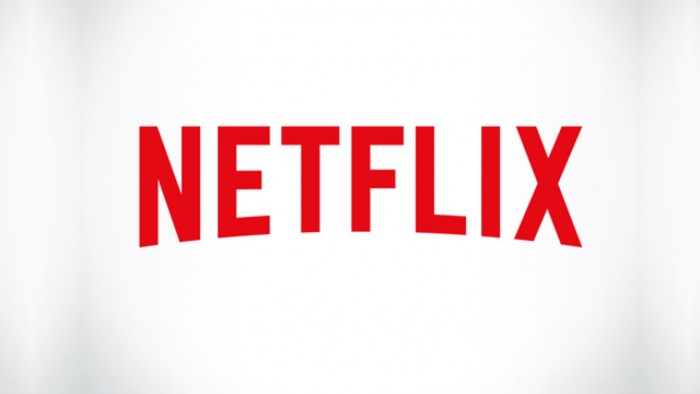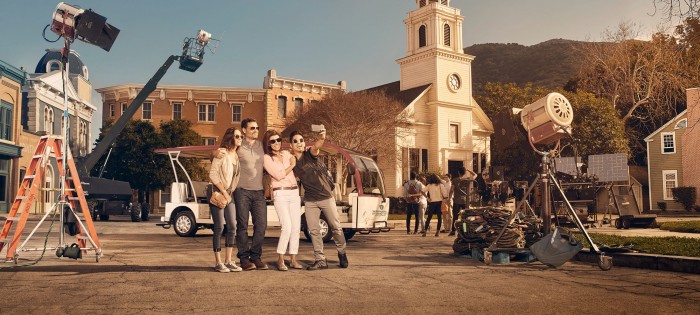Netflix Plans To Stop Chasing Tax Incentives And Hollywood Should Too
(Welcome to The Soapbox, the space where we get loud, feisty, and opinionated about something that makes us very happy...or fills us with indescribable rage. In this edition: Netflix plans to stop chasing tax incentives and why Hollywood should consider following their lead.)
One of my favorite things to do in Los Angeles is to walk through a movie studio lot. It's essentially just offices, enormous warehouses to house productions, and a few streets of fake backlot facades, but to me, these are special, magical places. It's a place where many of my favorite films were created. These days, the experience isn't without a little sadness.
The soundstages are lined with plaques showing all the famous movies that filmed inside their cavernous interiors. It takes walking past one or two soundstages to realize that most of the stages have not hosted a big movie in decades. Instead, there are huge gaps of years, often followed by a forgettable but hugely popular sitcom that has taken up residence for a number of years.
And that brings us to today's news: Netflix has announced that they plan to invest in California-based productions instead of chasing tax incentives. The sensible reasons behind this move might be something Hollywood should also consider.
The Reason to Chase Incentives
Hollywood barely shoots in Hollywood anymore. Production has been lured away to other states with the promises of tax incentives that can save a studio upwards of 30% on their local filming cost. This is big money. As blockbusters become larger and more expensive, the pull to Canada, Louisana or whatever state or country is offering the most significant incentive becomes even greater.
States offer the incentives under the guise that the film productions will bring money to the local economies. They usually require productions to hire local workers and sometimes background cast. However, some of those states have found the return on investment just isn't worth it and have cut or reduced their incentives. For example, North Carolina lawmakers drastically reduced film incentives after learning that $30 million in incentives led to the creation of only 60 or so new jobs in 2011.
Location, Location, Location
Often, the decision to shoot in a tax incentive state is not in cooperation with the film's story. I remember visiting the set of Battle: Los Angeles, which, due to incentives, was shot in Louisana. Dwayne Johnson's earthquake disaster movie San Andreas was mostly shot at the Village Roadshow Studios in Gold Coast, Queensland.
Don't get me wrong: on-location filming makes sense when it's in service to the story. I can't imagine what Kong: Skull Island would look like if it didn't film on location in Vietnam or if Lord of the Rings didn't shoot in New Zealand. Not every production should be shot in Hollywood, just as every TV show shouldn't be shot in Canada. Of course, there are success stories to be found. Look to Breaking Bad, which went to Albuquerque, New Mexico for their tax incentives and ended up making the city a vital part of the show's mystique.
Aside from the obvious location benefits, there are other positives to a production filming elsewhere. The comradery between those out-of-town actors and crew can be strengthened by the shared experience of bunking up and putting on a show in a remote city versus the experience of shooting a film near their home, with everyone going off back to their normal lives when production wraps for the day.
Why Netflix Plans To Stop Chasing Production Tax Incentives
Netflix Chief Content Officer Ted Sarandos revealed to The Wrap that Netflix intends to invest in California-based productions instead of pursuing tax incentives:
"I personally believe instead of investing in tax incentives that we should invest in infrastructure. [Moving productions to benefit from tax incentives] is very tough on families and eventually it grinds on the talent. If people were enjoying their work, they would do better work. That's been our own corporate philosophy too. [...] It puts the onus on the cast and crew who have to travel. You move to Los Angeles, or you grew up in L.A., because you wanted to be in show business — and then you have to move to New Orleans six or eight months a year. I hope you save enough money to put a $100 million production at risk by having a lot of miserable people around. [...] I'm happy to participate in the incentives if they work, but there is a cost on the creative of the show. Veep is a great example, when they moved form Baltimore to L.A., it got way better. They have the best writers on television now. The show is funnier, everyone's happier. I think it shows up on screen. Shooting in L.A. is an investment in the quality of the show."
So far, Netflix shoots Grace and Frankie on the Paramount lot, Kathy Bates' upcoming Disjointed and Ashton Kutcher's The Ranch on the Warner Bros. lot in Burbank, and Justina Machado's One Day at a Time films at Sony Pictures in Culver City. Drew Barrymore's Santa Clarita Diet and Sylvester Stallone's Ultimate Beastmaster both shoot in Santa Clarita. Their $90 million Will Smith movie Bright was shot entirely on location in downtown Los Angeles. But these productions make up a fraction of the Netflix Originals produced in-house and released thus far, although Sarandos says that is changing.
Ted also says he hopes to improve the quality of Hollywood's historic soundstages, which he said need "better stage facilities" and "more current technology — some of these stages you shoot on in L.A. haven't been touched since the 1930s."
Why Hollywood Should Consider Following Netflix's Lead
I have visited many sets over the last decade, most of which were not in California. Some of the places appear to be great places to live and work, while others seem to be much less enjoyable. I've been on the set of some films in humidity and heat that could only be described as miserable. It's hard to imagine that these productions don't suffer from the experience. And even if it's a comfortable gig in a good town, you're still working far away from your family and friends. It has to wear on you a little bit.
Some of these production cities have built up excellent infrastructure, state-of-the-art soundstages, and very experienced crews that know what they are doing. But in Hollywood's chase for the next bigger incentive, they quickly run from these cities to other states with far less experienced crews.
It seems weird to me that the movie business isn't taking a cue from other industries. Companies like Apple, Google and Pixar have invested a lot of money to hone their corporate culture with the belief that the happiness of their workers will show in their final products. It would be interesting if Hollywood followed Netflix's lead and assessed the cost of savings against the happiness of their on-set creatives.
Even Sarandos says that Netflix is in a unique situation that he doesn't take for granted, and admits that if he were an independent producer, he'd probably chase the tax incentives as well. But it seems to me that Hollywood needs to find a better system that is more creatively focused. With Netflix making a big play towards original films, the streaming company will no doubt attract top talent by offering them more creative freedom opportunity to work close to their Los Angeles homes. This will hopefully force the Hollywood studios to be more competitive in this arena.




